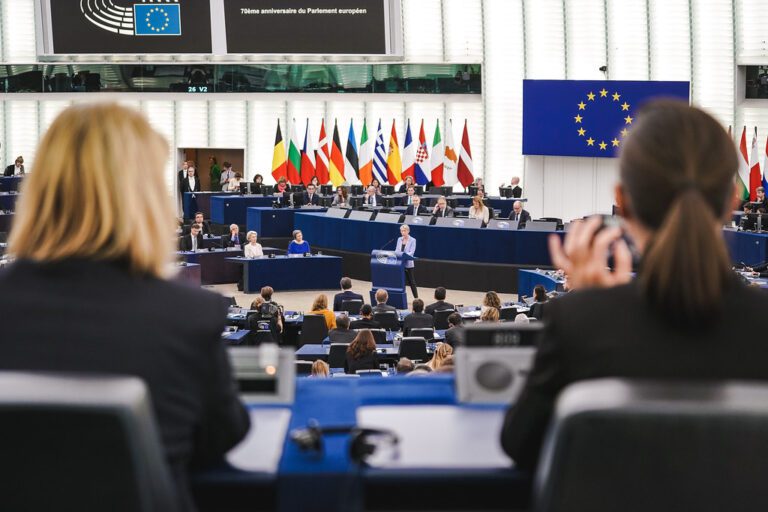Invisible but Influential: How Parliamentary Assistants Can Shape the European Parliament’s China Agenda

This article is part of a newly launched section of CHOICE dedicated to in-depth investigations and personal insights that illuminate the lesser-known dimensions of Chinese influence in Central and Eastern Europe. In this space, we invite journalists, influencers, researchers, civil society actors, and others with first-hand experience to share stories that we believe decision-makers cannot afford to ignore. From covert media campaigns to subtle outreach tactics, this series shines a light on the informal tools and overlooked actors shaping perceptions of China in our region.
CHOICE has compiled an exclusive dataset and analyzed the function and recruitment of Accredited Parliamentary Assistants (APAs), whose extended networks and expertise have drawn the attention of Chinese influence and intelligence operations targeting the European Parliament (EP). The investigation identifies one of the blind spots that may allow Beijing to gather information on EU institutions, influence European discourse, and interfere in EU-US relations.
Chinese Influence over EP Calls for Caution
Beijing has paid close attention to European politics over the last couple of years. In the current context of strained transatlantic relations, Xi, in particular, sees an opportunity for a reset of European views and discourse on China. He has repeatedly called on the EU to increase cooperation with China and jointly resist America’s “unilateral bullying.” Yet, unequivocally cozying up to Beijing remains a relatively marginal view in the EU, which perceives China (among other things) as a systemic rival with whom points of divergence on both trade and human rights remain unresolved.
To better understand EU institutions and strengthen influence over them, Beijing has used both official diplomatic channels and subtler means, illustrated by reported cases of espionage and corruption. In mid-December 2023, a joint investigation by Le Monde, Der Spiegel, and the Financial Times revealed that Frank Creyelman, a former Flemish parliamentarian from a far-right group in Belgium, was tasked with several assignments by a Chinese intelligence agent.
This year’s events further highlighted the vulnerabilities of the European Parliament to Chinese intelligence and influence. In March 2025, the Huawei lobbying scandal involved allegations of illicit lobbying activities by the Chinese state-linked company, aiming to secure strategic influence over the EU’s digital infrastructure development. The former senior lobbyist for Huawei in Brussels, Valerio O., had worked as an APA for a decade before joining Huawei – a background that was at the center of Huawei’s interest in his profile.
The following month, Jian Guo, the assistant to far-right MEP Maximilian Krah (AfD), was arrested on espionage charges, accused of working for a Chinese intelligence service and of passing more than 500 documents to Beijing, as well as information about EP decisions and debates. In addition to offering tangible proof of Chinese operations in gathering intelligence and influencing the European Parliament, these cases reveal that APAs’ unique expertise and understanding of the EU institutions’ inner workings pose a systemic risk of foreign interference in the European Parliament.
CHOICE Response: The Report’s Aim and Methodology
In the light of these events, CHOICE sought to examine structural vulnerabilities within the European Parliament that render it a potential target for foreign influence efforts. To fill a research gap on these vulnerabilities, CHOICE conducted the first in-depth investigation and data collection on the role of APAs.
APAs are essential to the work of MEPs: they conduct research, draft policy briefs, manage stakeholder relations, and serve as gatekeepers to their MEPs. Because of this strategic role and the privileged access it provides, APAs almost inevitably attract the attention of malign foreign actors. The report sets aside concrete allegations and individual cases to scrutinize the APA function and recruitment.
It offers a structured look at more than 3,000 APAs who served during the 9th and 10th EP terms. It rigorously combines data obtained through scraping EP website archives, anonymized interviews with current and former MEPs, APAs and EP observers, and systematic open-source checks. Through this analysis, CHOICE intends to shed light on the under-researched security deficiencies that may open pathways to malign foreign influence, especially as related to the People’s Republic of China.
The Systemic Blindspots
APA Hiring Process
APAs are hired directly by MEPs or political parties, with their salaries funded from a parliamentary budget. During our investigation, we found that this process is largely informal: hiring often depends on personal or political connections, with few postings and limited transparency.
APAs’ contracts stress the principle of trust in the MEP-APA relationship but involve no security screening, for the sake of flexibility and efficiency. Instead, candidates are only required to provide a clean criminal record and a conflict-of-interest declaration. There are also no conditions of eligibility related to nationality, age, or dual citizenship, meaning non-EU citizens and EU citizens with prior non-EU citizenship (including via residency or golden visa schemes) may all serve as APAs.
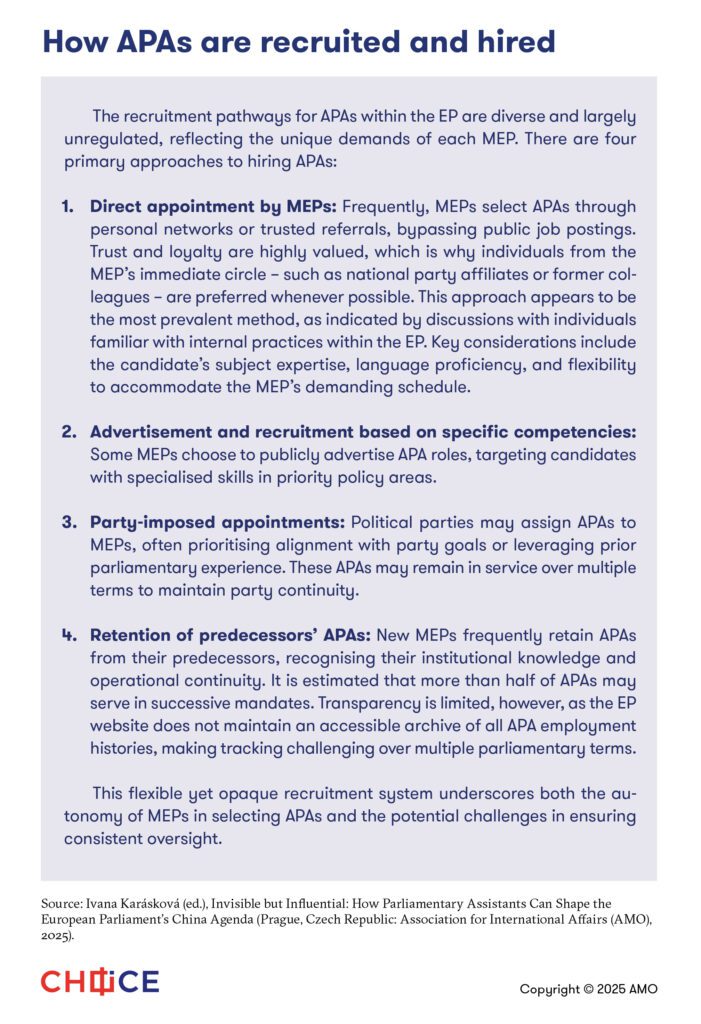
APA Sharing and Movement
Our analysis revealed that a significant number of MEPs share APAs, a practice that can be attributed to practical considerations such as a common language. Another important factor, however, is the APAs’ expertise – an asset that becomes particularly valuable when it is scarce in the European Parliament, as in the case of China competence.
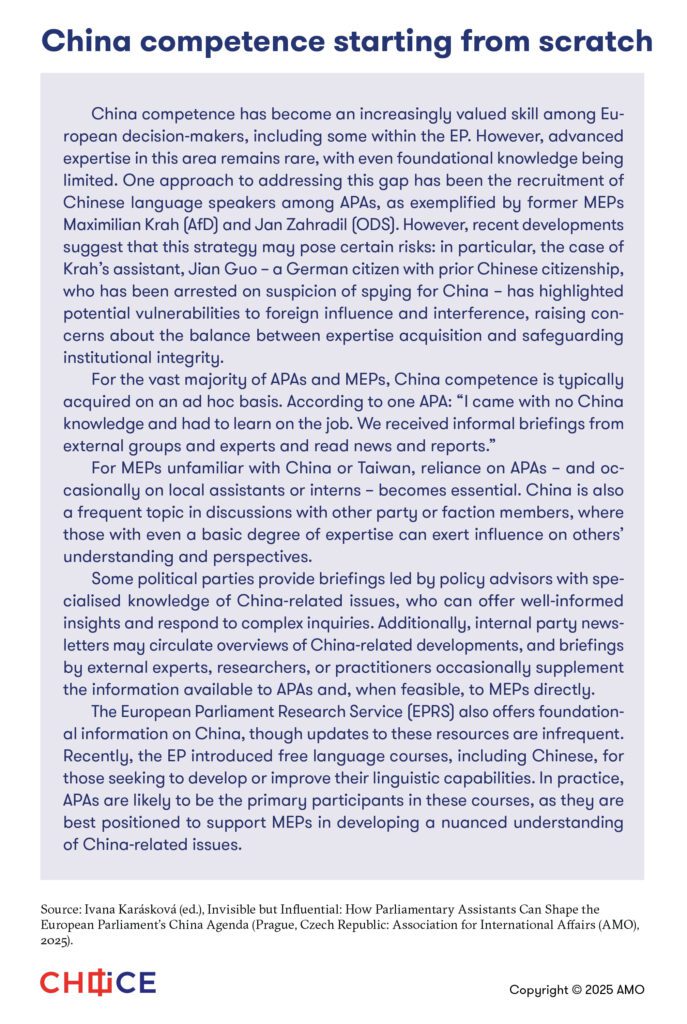
However, the practicality of sharing APAs brings with it security concerns. The interactions of APAs with MEPs across different factions and political parties grant them access to a wider spectrum of information, giving APAs a unique position to gain insights into the activities and decisions of MEPs across different political leanings. Their extensive networks can also make them the primary target of foreign actors that seek to gain access to sensitive information or exert influence over decision-making within the EP.
We found that 225 assistants served more than one MEP during the 9th term, and the number increased to 354 during the 10th term. APA-sharing among MEPs is particularly common within the European People’s Party (EPP) and the Socialists and Democrats (S&D) groups. Notably, Spanish MEPs demonstrate a higher tendency to share APAs, both within their own political factions and parties and across factional and party lines. The data indicates that APA-sharing is not limited to a small number of MEPs, as some assistants work simultaneously for nine or more members of the European Parliament.
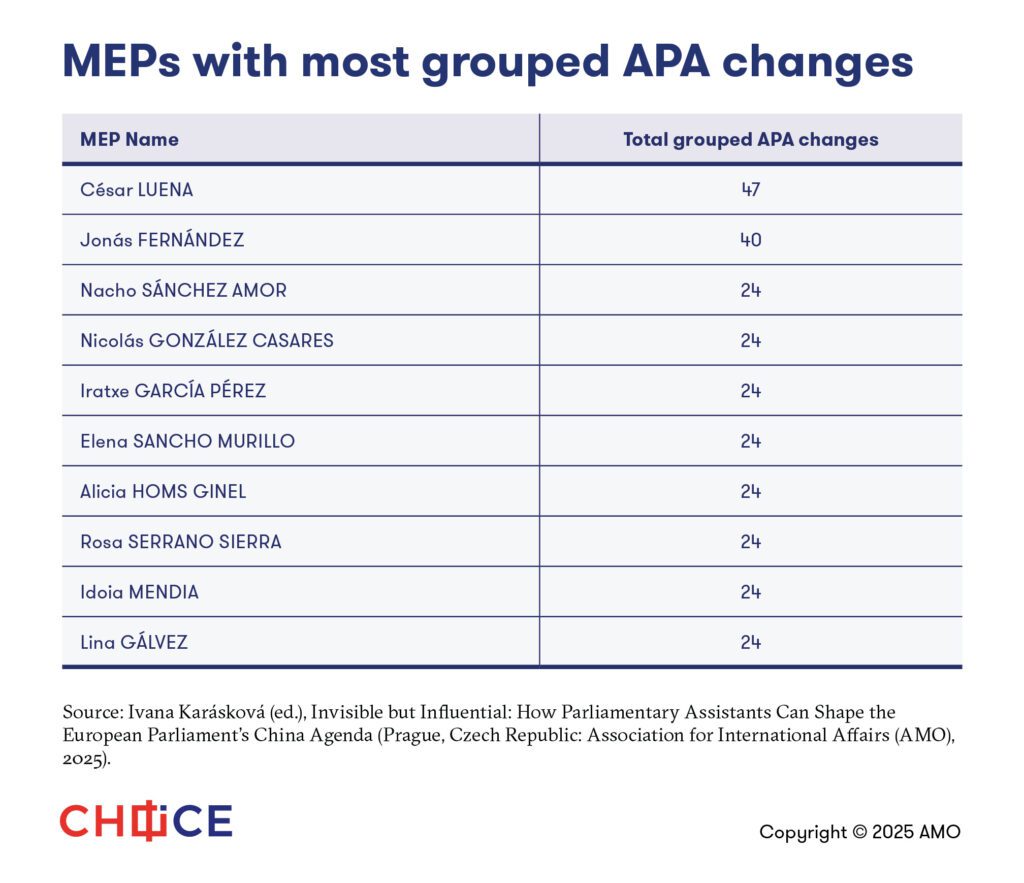
To see the clusters of APAs around particular MEPs in an interactive form, click here or on the image. Search the names of MEPs to get information about their APAs.
(Please note that the visualization may take several minutes to load due to the large number of images it contains, so we kindly ask for your patience.)
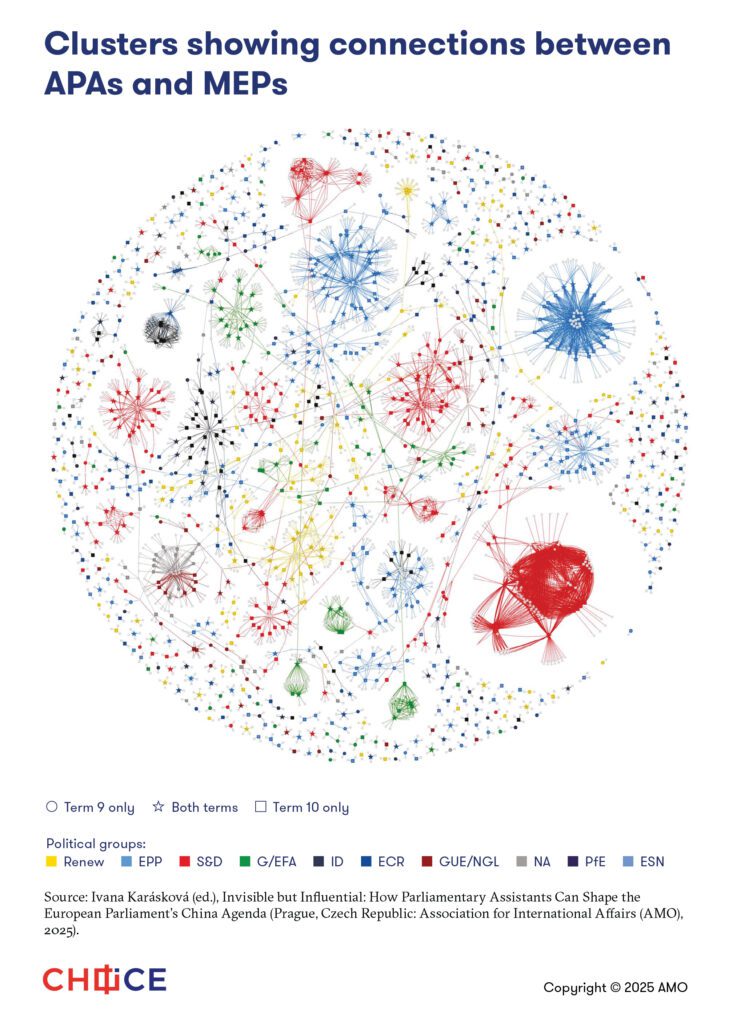
Another notable finding is the movement of APAs between terms. According to our data, around 600 APAs remained working at the EP during the transition from the 9th to the 10th parliamentary term. Of these 600, 41.3 percent maintained their position with the same MEP(s). Among the APAs who switched to different MEPs, 38.5 percent moved because their original MEP(s) left Parliament, 5.5 percent moved despite their original MEP(s) retaining their position, 12.5 percent stayed with the same MEP(s) and started working for another on top of that, and 2.2 percent of APAs stayed with their original MEP(s) while also leaving one or more of the MEPs they worked for during the 9th term.
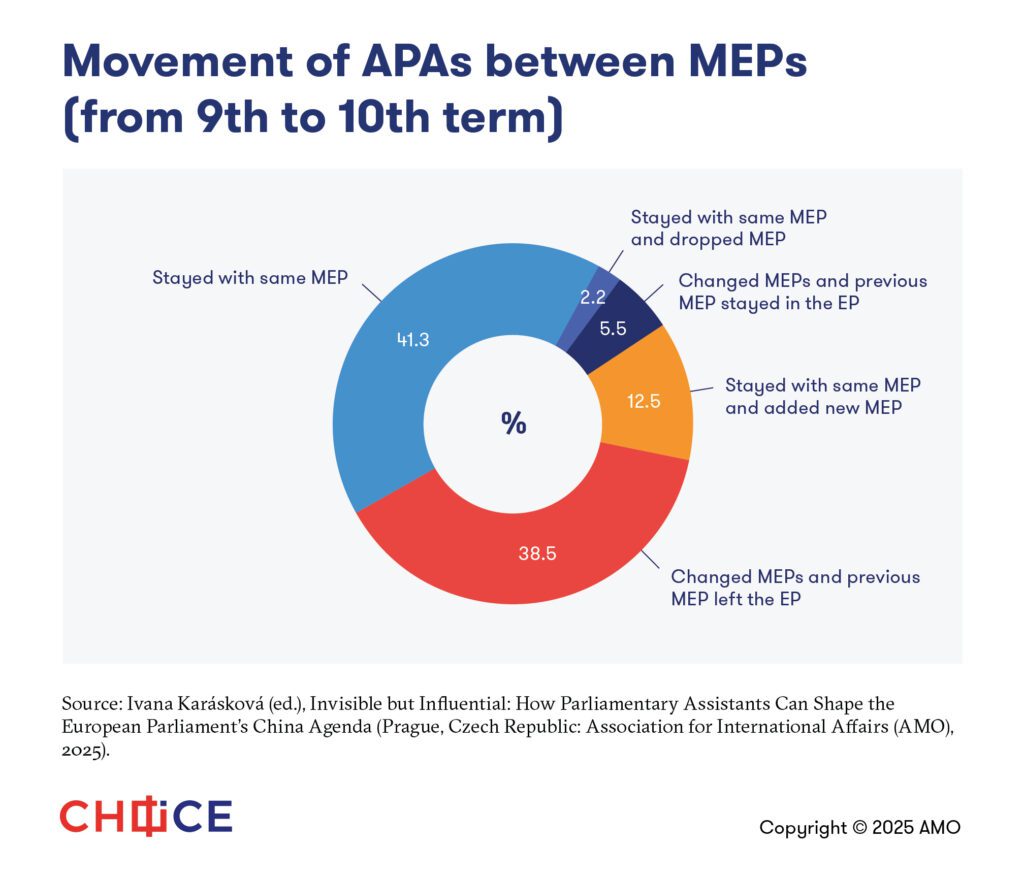
Between the terms, the most significant increase in APAs was experienced by Italy’s Fratelli d’Italia and Polish Platforma Obywatelska. In comparison, the largest number of APA departures were observed in France’s Renaissance party, Italy’s Lega party, and among independent MEPs, which could be a consequence of their loss of seats after the 2024 EP elections.
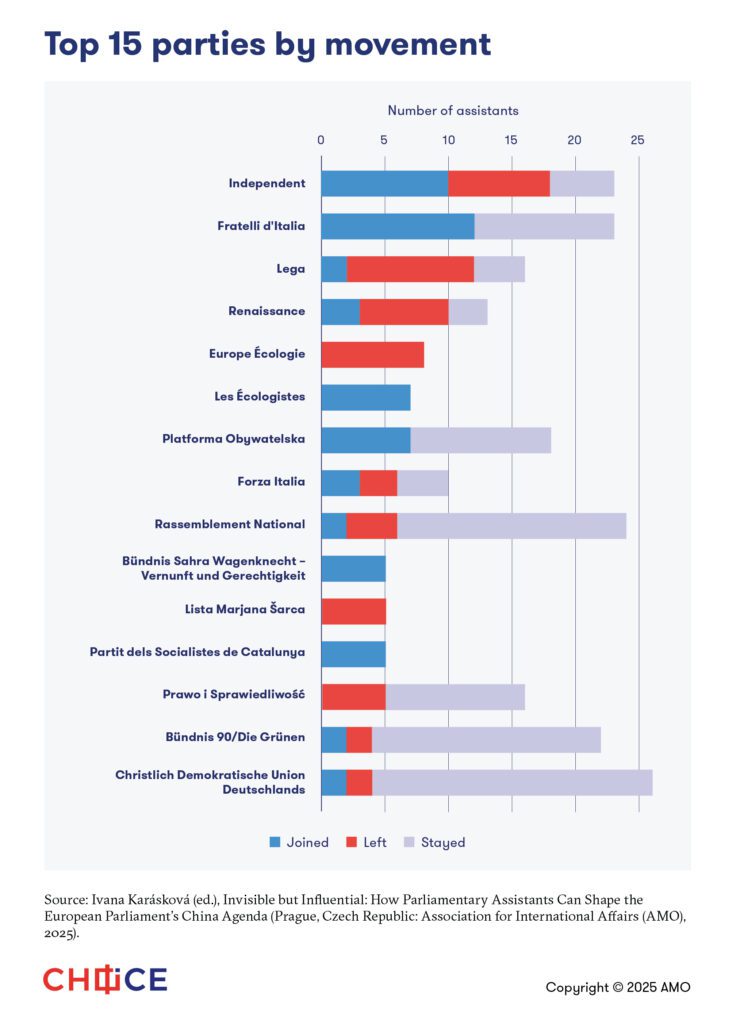
Building a Resilient European Parliament
While APAs’ mobility and networks strengthen the coherence of the European Parliament, they also increase its vulnerability. We argue that the openness of the EP system should be balanced with safeguards, ensuring that assistants continue to support MEPs while protecting the integrity of European democracy.
Based on this investigation, we devised a set of recommendations to address systemic vulnerabilities and prevent malign foreign actors from gaining access to the European Parliament. You can find the recommendations in our paper “Invisible but Influential: How Parliamentary Assistants Can Shape the European Parliament’s China Agenda.”
Written by
CHOICE
CHOICE is a multinational consortium of experts providing informed analysis on the rising influence of the People’s Republic of China within the countries of Central and Eastern Europe (CEE).


